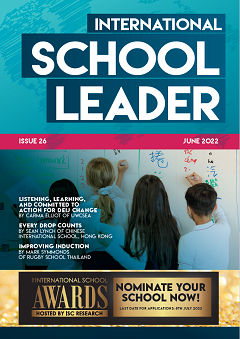By Tom Wingate
Schools, and I include this British international one, are often keen to bandy about the term ‘leadership’. We tell our high school cohorts, and especially those students who are within touching distance of universities, that their admissions officers will be keen to see evidence of this key personal characteristic.
Well, we are keen to do so because it is a fact. How the world needs all manner of superior, humane guidance, to protect itself from self-inflicted economic, military, and ecological harm.
But it begs the question. In placing so much value on acquiring leadership skills, what exactly are we promoting, and how?
A view from the classroom
Curious about what our multicultural students think of the above questions, in February 2024, I became an interloper in an English lesson, to sit down with a group of fifteen-year-old students to discuss this very topic. As ever, I was struck by how thoughtful such young people can be when discussing tricky topics.
Slightly hesitant to chip in at first, the rhythm soon picked up. We started with possible definitions, leaving Lenin’s cynical “Who whom?” in the dust. True leadership was not a question of giving orders but, rather, “being a guide.” As a leader, “it is not always saying what you want,” either. It is also a “confidence thing” which may well involve saying “I was wrong,” too. Indeed, that admission is not a sign of weakness: far from it. Leaders, it was thought, frequently combine innate qualities, and learned ones. They understand ‘the goal’ more than most and can lead others towards it. If patient enough, it was suggested that many people certainly can learn that role.
“A good leader listens”
Leadership qualities
And the helpful inner qualities real leaders should possess and display…? “Honesty” and “respect for others” were right at the top of the list for most or, if not there, close. Having the ability to verbally encourage others was highly thought of, too. To be effective, “an authentic pride taken in helping others” – their acquiring and developing a skill – is a necessary leadership characteristic. And yet, “having thought through a situation, a leader must not then be fearful of upsetting others”. For, after all, who can please all of the people all of the time?
Other necessary leadership qualities and abilities cited included: “being humble and self-reflective;” “an ability to create trust;” “knowing how to be empathetic;” “possessing a degree of wisdom;” “exercising self-discipline;” “discerning how and when to do the right thing;” and “being bold and yet also knowing when to back down”. A seemingly simple, passive comment I especially liked said this: “A good leader listens.”
The roles in society a leader might play?… Multifarious, of course. Strangely, politics had not yet been that much mentioned. Instead, given that I was talking with a group of healthy teenagers, perhaps it was unsurprising that leadership and sports soon had taken centre stage. When considering team sports, leadership became morphed with the idea that his or her team must win. War fought another way! Although often in the spotlight, it was noted that the team captain (who, by the way, “should not yell”) is not the sole person who will achieve public victories.
And, apart from the obvious world of leadership in sports teams? The students recognized that plenty of relatively quiet leaders exist who do not occupy obvious roles within our many institutions and societies. One student pointed out, for example, that good authors, even from beyond the grave, can make us change direction in life. In addition, “a leader is not a person who must always win by beating an opponent.” However, just like Atticus Finch, all leaders – in schools, the House Captains, those elected to Student Councils, and then those occupying more anonymous roles, like older, responsible siblings – must be able to stand in another’s shoes. It’s as though, in that very moment, “another leader is being formed”.
Substance over style?
The students also discussed how, inevitably, some leaders just “look the part”. They admitted that appearance, like striking Hollywood actors, inevitably affects how we view, appreciate and look up to others. Yet, there’s a real danger: the superficial can fool us. Finally, politics inevitably reared its head in our discussion. Good. The comment was made by a historian in the group that, in the 20th Century, there were plenty of fake, narcissistic leaders who rapidly brought the world to the verge of utter ruin. How true; how sad. Yet, the session could not end on such a note. Nor did it.
Educators often seek silver bullets for all kinds of solutions. (I have yet to find any!) Yet, we are optimists by definition. So, has this school found somewhat successful ways to help develop leaders, perhaps the students with whom I had spent such a pleasant, informative class?
Yes. Of course. At The Wingate School, we really try to give the students the intellectual and social tools to steer their own learning and personal development. Here are, I trust, a few helpful suggestions.
- Each week, the students reflect on the week just gone. It is a big deal. Successes, challenges still to overcome? These important written reflections, in well-maintained agendas, build up a handy record of their progress.
- In tandem with the above, we interleave teachers’ official reports with those written by the students. The combination of feedback and ‘feeding forward,’ greatly helps the students achieve progress. That student is one who is taking charge of his or her life. Namely, a leader.
- The self-confidence that young leaders develop through practising public speaking and debating is, I would argue, highly fruitful.
- Find appropriate opportunities for the students to understand what respect for others – our no.1 school rule – entails. Social responsibility projects in the wider community, guided by staff but run by students, helping local orphanages or day centres for the elderly, open students’ eyes to real needs.
- Our sports here include some sports psychology. Learning to lose matches with grace, but being ready to bounce back, also is a great lesson in leading a fuller life. (We are working on those “Sports is like a war” students!) Also, embrace failure, as J. K. Rowling famously pointed out in her 2008 Commencement Address to Harvard graduates.
The lesson was ending… My fifteen-year-old students admitted that finding such extraordinary fledgling leaders in our schools – in our societies – can be a tall order. Few, surely, could have all the qualities one desires. But finding and developing good leaders is not impossible! And thank goodness for that.
I would like to acknowledge the contributions made by the following Wingate School students in the composition of this article:
Michelle A. B., Santiago B. Z., Andrea F., Ivanna G.R., Lucia G.G., Andrea G.R., Nicolas L.,Galia M., Monserrat O., Paula S., Sofía D. C. and Dominique R.P.

Tom Wingate is the Head teacher at The Wingate School in Mexico City. You can connect with Tom on LinkedIn or directly via email.




